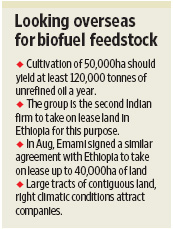LiveMint | 11 March 2010
The construction company has decided to cultivate pongamia pinnata and edible oil seeds there
Shutapa Paul
Kolkata: The 140-year old construction firm, Shapoorji Pallonji and Co. Ltd, on Tuesday signed an agreement with the government of Ethiopia to take on lease up to 50,000ha of land to cultivate pongamia pinnata—a feedstock for biodiesel—in its first major step to expand its fledgling renewable energy business.
“Initially they will take around 10,000ha and gradually scale up cultivation,” said Mehreteab Mulugeta, minister councillor for economic affairs at the Ethiopian consulate in New Delhi.
Ashok K. Gupta, who heads the Shapoorji Pallonji Group’s energy division, confirmed the signing of the lease agreement but refused to give any other detail.
Officials of the group have been visiting Ethiopia for almost a year. The group has decided to cultivate pongamia pinnata and edible oil seeds there, Mulugeta said.
The group is the second Indian company after Emami Biotech Pvt. Ltd, an arm of personal care products maker Emami Ltd, to take on lease a large tract of land in Ethiopia for cultivation of biodiesel feedstock.
In August last year, Emami Biotech signed a similar agreement with Ethiopia to take on lease up to 40,000ha for cultivation of jatropha, another biodiesel feedstock, and edible oil seeds.
Emami Biotech would be investing Rs300 crore in the next few years, according to its director Aditya V. Agarwal.
The company is looking to produce up to 100,000 tonnes of crude oil in Ethiopia, which would be shipped to its plant in Haldia in West Bengal for processing.
A large number of international companies have taken land on lease in Ethiopia for cultivation of biodiesel feedstock, according to the Ethiopian government.
Ethiopia has emerged as one of the preferred destinations for biodiesel manufacturers because of “availability of large tracts of contiguous land and the right climatic conditions. Government procedures are simple and the people there are helpful and hardworking,” Agarwal said.
Though considered a good feedstock for biodiesel, pongamia pinnata plants take about eight years to grow, according to Mulugeta, whereas jatropha takes three-four years.
Mulugeta, however, could not explain why the Shapoorji Pallonji Group chose to cultivate pongamia pinnata and not jatropha.
It isn’t immediately known whether the Shapoorji Pallonji Group would set up a crude oil processing plant in Ethiopia, but Mulugeta said it is clear that the firm wouldn’t form partnership with a local company.
Cultivation of 50,000ha should yield at least 120,000 tonnes of unrefined oil a year, going by the thumb rule that the standard yield per acre is around one tonne, Agarwal said.
In September 2008, the group had formed a joint venture with state-owned oil marketing and refining company Bharat Petroleum Corp. Ltd and Nandan Biomatrix Ltd—a Hyderabad-based farm products manufacturer—for jatropha cultivation in Uttar Pradesh.
At the time of inception of the joint venture company, its promoters had said they would jointly invest up to Rs2,200 crore and produce up to one million tonnes of biodiesel by 2015.












